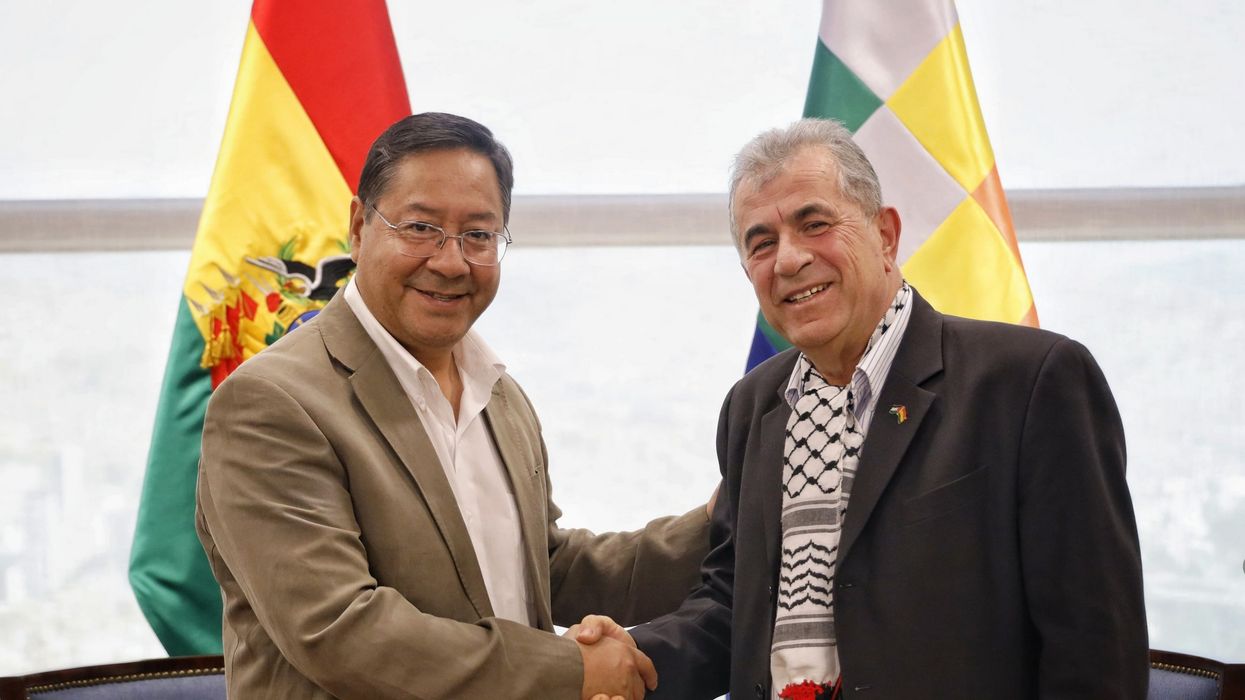'Democracy Must Be Respected': Bolivian Leader Replaces Military Chiefs Over Coup Attempt
Leftists and political leaders around the world slammed the coup effort as Bolivia's trade union federation called for an emergency mass mobilization and a general strike.
This is a developing story… Please check back for possible updates...
Bolivian President Luis Arce replaced top military leaders on Wednesday in response to an attempted coup d'état in which troops took over Plaza Murillo in La Paz and rammed an armored vehicle into the doors of the presidential palace so soldiers could storm the building.
"We denounce irregular mobilizations of some units of the Bolivian army," Arce, a member of the Movement for Socialism (MAS) party,
said on social media. "Democracy must be respected."
As
The Associated Pressreported:
In a video of Arce surrounded by ministers in the palace, he said: "The country is facing an attempted coup d'état. Here we are, firm in Casa Grande, to confront any coup attempt. We need the Bolivian people to organize."
Arce confronted the general commander of the army—Juan José Zúñiga, who appeared to be leading the rebellion—in the palace hallway, as shown on video on Bolivian television. "I am your captain, and I order you to withdraw your soldiers, and I will not allow this insubordination," Arce said.
Zúñiga told local media that "the three chiefs of the armed forces have come to express our dismay. There will be a new Cabinet of ministers, surely things will change, but our country cannot continue like this any longer."
Sharing his demands, Zúñiga said, "Stop destroying, stop impoverishing our country, stop humiliating our army."
The general claimed that the air force, army, and navy were "mobilized" and "the police force is also with us."
Meanwhile, "Arce swore in three new leaders of the armed forces," according toBuenos Aires Herald managing editor Amy Booth. "At the ceremony, army Commander in Chief Wilson Sánchez ordered the forces back to their barracks and at the moment they seem to be listening."
Despite the rift between former Bolivian President Evo Morales, who remains head of MAS, and Arce, who was his finance minister, Bolivia's ex-leader also spoke out against the military action on Wednesday, declaring that "the coup d'état is brewing."
"At this time, personnel from the armed forces and tanks are deployed in Plaza Murillo," Morales said. "They called an emergency meeting at the army general staff in Miraflores at 3:00 pm in combat uniforms. Call on the social movements of the countryside and the city to defend democracy."
After the change in military leaders, Morales—who has denounced his own 2019 ouster as a coup—demanded that "a criminal process" targeting "Zúñiga and his accomplices" begin immediately.
Wednesday evening, Bolivia's attorney general ordered "all legal actions that correspond to the initiation of the criminal investigation against Gen. Juan José Zúñiga and all other participants in the events that occurred," according toKawsachun News.
The Bolivian Workers' Center (COB), the South American country's trade union federation, had "called for an emergency mass mobilization and a general strike in response to the ongoing coup attempt," Progressive International highlighted on social media.
Progressive International also urged "international attention to these grave violations of Bolivian democracy."
Condemnation of the coup attempt and expressions of solidarity with those opposing it were shared around the world.
"We condemn the attempted coup in Bolivia and send our solidarity to President Luis Arce and his democratically elected government," declared the Peace & Justice Project, founded by Jeremy Corbyn, a member of the U.K. Parliament who used to lead the Labour Party.
European Commission President Ursula von der Leyen said that "I firmly condemn the attempts to overthrow the democratically elected government of Bolivia. The European Union stands by democracies. We express our strong support for the constitutional order and rule of law in Bolivia."
U.S. Congresswoman Ilhan Omar (D-Minn.) emphasized that she is "standing in solidarity with the Bolivian people as they fight to preserve their democracy," and "the coup attempt must be unequivocally condemned."
The Democratic Socialists of America's International Committee wrote on social media that "we extend our solidarity to the Bolivian people during this imminent emergency."
Morales said later Wednesday that "we appreciate all the expressions of solidarity and support for Bolivian democracy expressed by presidents, political and social leaders of the world. We are convinced that democracy is the only way to resolve any difference and that institutions and the rule of law must be respected. We reiterate the call for all those involved in this riot to be arrested and tried."

